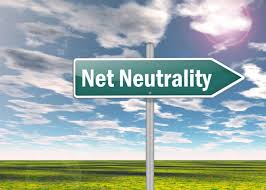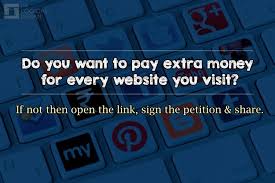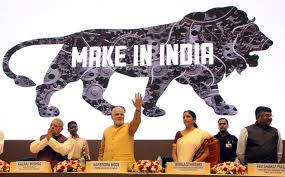When was the last time you remember sending an SMS to someone? Or used a phone which does not support internet? With internet becoming a utility rather than a luxury and apps like Whatsapp, Skype, etc becoming increasingly used as a medium of communication, we have gotten ourselves interwoven into a digital world where we cannot imagine our life without them. In this new era of digitalization, internet has globally become indipensible, and is being seen as a stepping ladder to boosting economic growth.
Recently, the internet has been bombarded with posts on supporting net neutrality and opposing the bureaucracy of the telecom operators. So what exactly is net neutrality? It has actually a very broad meaning, but in simple terms it means that all data on the internet is to be considered equal. That is, whether you are using Whatsapp, or Facebook, or Youtube, or Skype with your data connection, you should be charged the same to access them; and all should be accessible at the same speed. So basically, if you install data pack on your phone, then whether you use Whatsapp or Skype, it doesn’t matter; you will be charged the same.
So, in December, 2014, one of India’s leading telecom operator, Airtel forwarded a petition to the Telecom Regulatory Authority of India (TRAI) to make Internet companies to pay them extra to allow users to get free internet access. What this means is that in addition to paying for your data pack, if you want to use Whatsapp, you will have to pay an additional amount to use it; otherwise either it will work at excruciatingly slow speed or it won’t work altogether. The reason for proposing this was that due to diminishing use of SMS and the exponentially increasing use of data packs, the telecom operators are facing a loss of Rs 4000 crores annually. What they have not mentioned is that Airtel’s quarterly gain on internet packs has increased by 75% in this financial year itself.
Not only will it restrict our use of internet, but no net neutrality will be detrimental for upcoming start-ups, which rely heavily on internet. With the new government’s intiative on making India digital by the end of 2015 all set to launch next month, it will give a huge boost to the emerging digital media based start-ups. But it relies heavily on internet. So if the internet is split into different channels, each being charged a specified amount to access it, it will undermine the spirit of accessing the whole of internet freely, and will prove to be a great hurdle in the launching of such start-ups. This would discourage budding entrepreneurs, as they might not have sufficient funds to pay the telecom operators each time they decide to add a new feature to their website. This means that Amazon will be able to raise funding to provide free internet access, but a local online retail website might not be able to raise enough funding and hence will not be accessible, thus encurring huge losses.
In response to the opposition it faced, TRAI released a consultation paper on Over The Top (OTT) services, that is those services which let you use internet over mobile phones (such as Whatsapp, Skype etc) and is seeking suggestions on 20 questions put on its website, which has to be filled and submitted by 24th April,2015. Based on the responses, TRAI will decide whether to grant such autonomy to leading telecom operators such as Airtel and Vodafone. But apart from this, countries all over the world have taken up a stand for net neutrality and have passed resolutions that no telecom operator will be allowed to restrict what you can do or see online. Some of these pro net neutrality countries include Chile, Brazil, the US (recently) and if India wants to pave its path to a developed economy, it is essential for it to provide full throttle support to net neutrality.
So now the most important question comes: How can we contribute towards this? You can go to www.savetheinternet.in and hit the Respond to TRAI botton. In just two clicks you can submit your response to TRAI, hence contributing your part in it. Also, there is video on Youtube by AIB giving information on net neutrality in a very effective manner. No net neutrality can affect usin disastrous ways, burning a big hole in our pockets being one of them. Also, as quoted by AIB:
“What is worse than no internet is slow internet”
#SaveTheIntenet
#SupportNetNeutrality
Click here for government certification in Information Technology





3 Comments. Leave new
You explained the topic well.
Very well structured article 😀
Good work 😀
Well written!